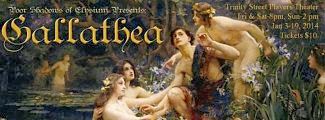
by Michael Meigs
Kevin Gates is intensely dedicated to the text of early modern English drama. In the same secret space where he was transformed into Shakespeare's Coriolanus just over a year ago, he has conjured up a graceful and whimsical staging of a work from the London of 1588 that you've not seen and probably have never heard of: John Lyly's Gallathea.
It's a pastorale that provides definitive evidence that Shakespeare wasn't the only dramatist whose plots sent young ladies disguised in men's clothing off to adventures, amorous and otherwise. Lyly's play was performed by the Children of St. Paul's for Queen Elizabeth on New Year's Day, Gates notes, and the Virgin Queen no doubt appreciated the many references to the 'virgins' in the leading roles: Gallathea and Phillida, whose fathers sent them off under manly cover in order to escape sacrifice to the god Neptune.
 |
| Rachel Steed-Redig, Kristin Hall (photo: Bridget Farias) |
One amusing hitch to this strategem: the two sweet women fall in love with one another.
You've certainly seen other avatars of Gallathea, by the way, for in Greek mythology she was the sculpture carved by Pygmalion and endowed with life by Aphrodite. George Bernard Shaw's play Pygmalion was the basis for My Fair Lady. And pastoral scenes were dotted throughout early modern European literature. Gates cites a 1574 play by Torquato Tasso. It so happens that Miguel de Cervantes' first work, a verse compendium published in 1585, was La Galatea.
Lyly's story shares little with the legend or those literary works except for a pastoral setting where various Greek gods vie with one another to exert dominion over the small number of rustics inhabiting the forest. Lyly sends three plots spinning through this 90-minute performance: the flight of the virgins and their finding of one another; the misadventures of some penniless brothers in search of fortune or at least of regular employment; and Cupid's attempts to cast tricksy spells upon huntress Diana's band of vestals, an effort to entice them from chastity to the pleasures of love.
Click to read more at CTXLT.com . . . .





No comments:
Post a Comment